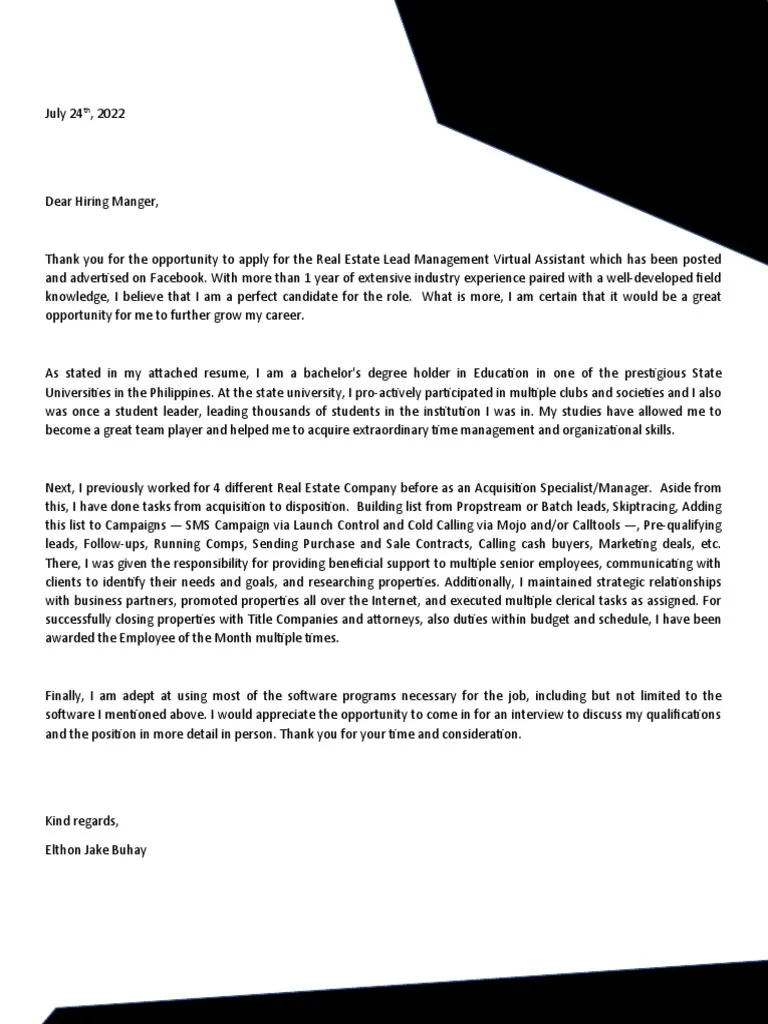What is a Real Estate Cover Letter
A real estate cover letter is a crucial document that accompanies your resume when applying for jobs in the real estate industry. It serves as your first introduction to a potential employer, providing an opportunity to showcase your personality, skills, and enthusiasm beyond what’s listed in your resume. Unlike a resume, which is a factual summary of your experience, a cover letter allows you to explain why you’re the ideal candidate and how your qualifications align with the specific job requirements. It’s your chance to make a strong first impression and demonstrate your interest in the role and the company. Think of it as your personal sales pitch, designed to persuade the hiring manager to invite you for an interview. A well-crafted cover letter can significantly increase your chances of landing your dream real estate job.
The Purpose of a Real Estate Cover Letter
The primary purpose of a real estate cover letter is to convince the hiring manager that you are the right fit for the position. It’s an opportunity to elaborate on your skills and experiences, providing context and highlighting achievements that might not be immediately apparent in your resume. The cover letter allows you to demonstrate your understanding of the real estate industry, the specific role, and the company’s values. It also allows you to express your genuine interest in the position and explain why you’re excited about the opportunity. A compelling cover letter can set you apart from other applicants, especially if you have relevant experience or skills that align with the job requirements. It’s your chance to personalize your application and make a memorable impression, increasing your chances of getting an interview and ultimately, the job.
Key Components of a Real Estate Cover Letter
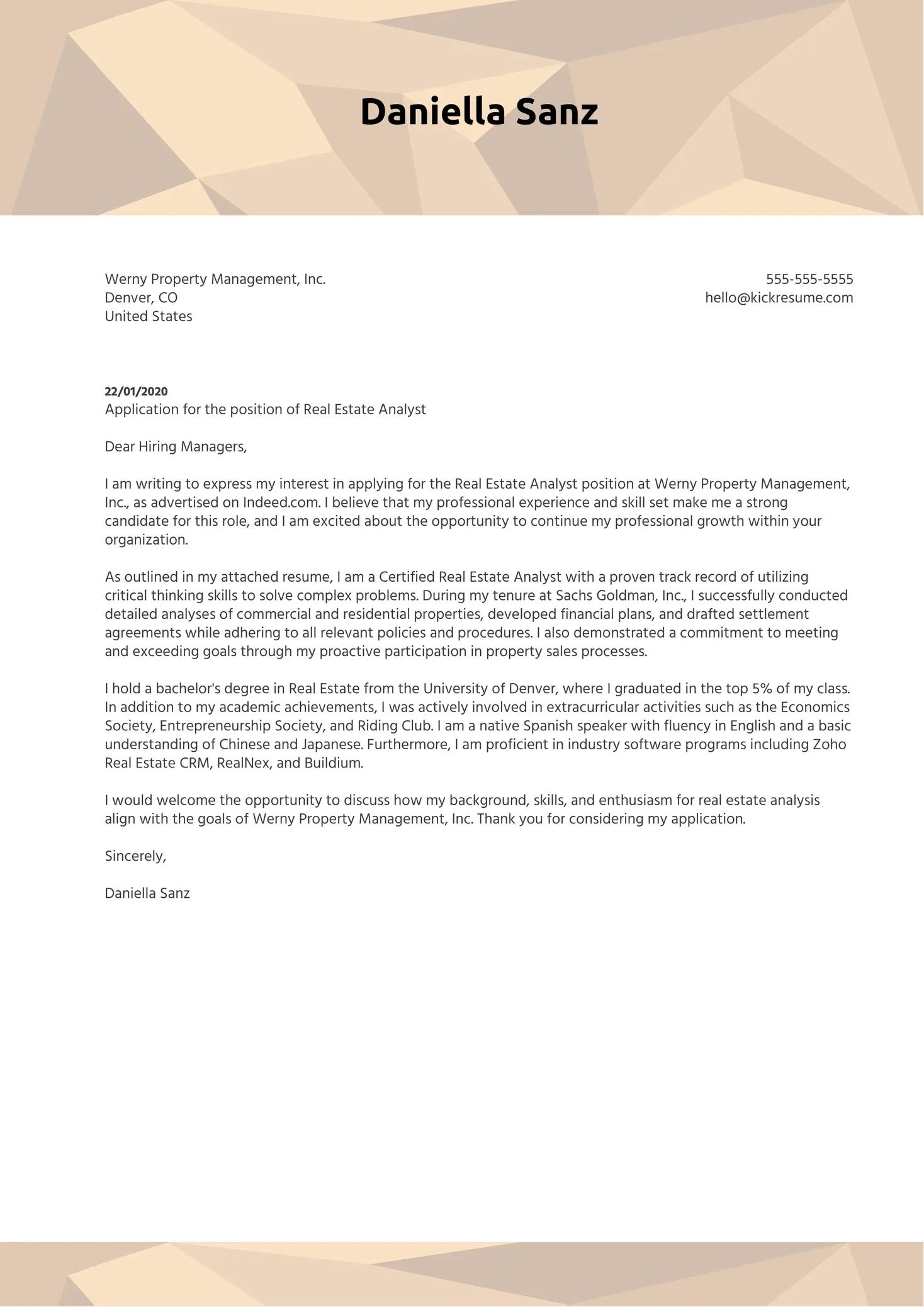
Contact Information
Your contact information should be clearly displayed at the top of your cover letter. This typically includes your full name, phone number, email address, and LinkedIn profile URL (if you have one). Make sure your email address is professional and your phone number is easily accessible. This allows the hiring manager to quickly and easily reach you if they want to schedule an interview or request more information. Ensure that your contact information is up-to-date and accurate to avoid any potential miscommunication or missed opportunities. Presenting your contact details clearly and professionally sets a positive tone for your application from the start.
Your Introduction
Your introduction should immediately grab the reader’s attention and state the purpose of your letter. Mention the specific position you are applying for and where you found the job posting. Briefly state your key qualifications and express your enthusiasm for the opportunity. Make it clear why you are interested in the company and what you hope to achieve in the role. The introduction is your first chance to make a positive impression, so be concise, confident, and enthusiastic. A strong opening will encourage the hiring manager to read the rest of your cover letter and learn more about your qualifications and experience. Keep it brief but impactful, setting the stage for the rest of your application.
Highlight Your Skills and Experience
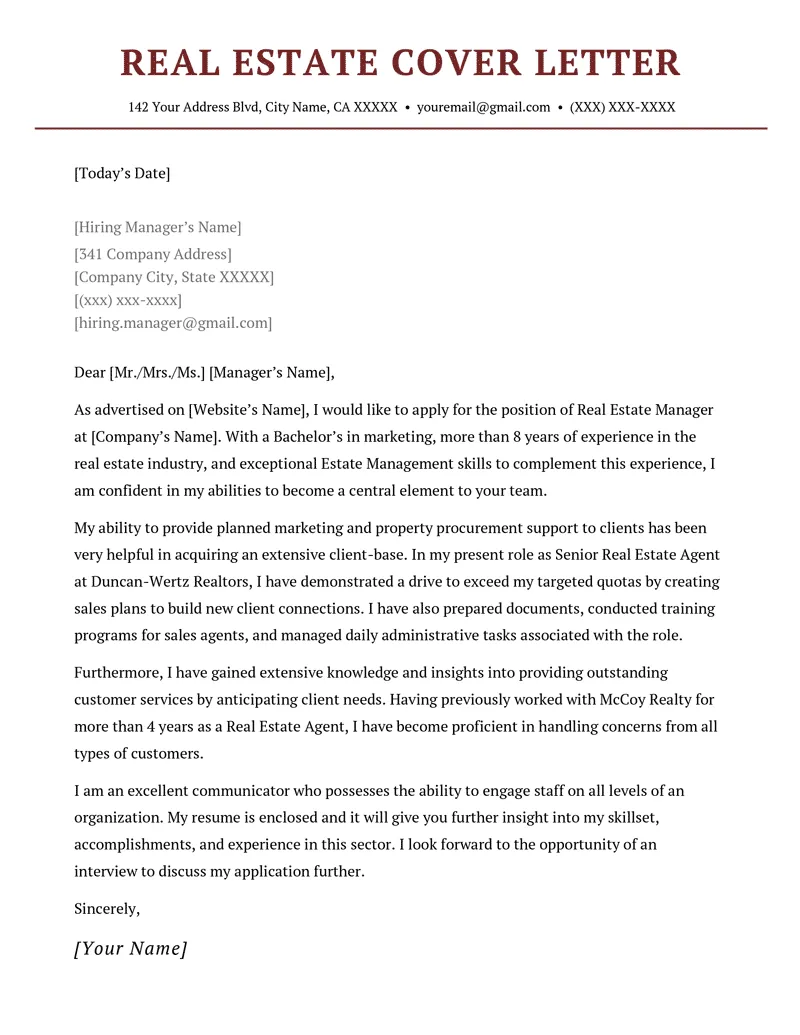
The body of your cover letter is where you showcase your skills and experience. Tailor your content to match the requirements of the specific job description. Highlight your relevant experience, quantify your achievements whenever possible (e.g., ‘increased sales by 15%’), and use keywords from the job posting to demonstrate that you are a good fit. Focus on skills that are most relevant to the position, such as sales, negotiation, communication, or property management. Provide specific examples of how you have used these skills to achieve success in previous roles. This section should prove to the hiring manager that you possess the necessary qualifications to excel in the position. It is crucial to make a strong connection between your background and the job responsibilities.
Tailor Your Letter to the Specific Position
Avoid using a generic cover letter. Customize your letter for each job application. Research the company and the specific role. Demonstrate that you understand the company’s values, mission, and goals. Mention specific aspects of the job that excite you and explain why you are a great fit. By tailoring your letter, you show the hiring manager that you have taken the time to understand the position and that you are genuinely interested in the opportunity. This personalized approach significantly increases your chances of standing out from the crowd. Show your interest by referencing the company’s website, recent news, or a specific project that resonates with you.
Express Your Enthusiasm
Expressing genuine enthusiasm for the role and the company is key to making a positive impression. Show your excitement about the opportunity and explain why you are passionate about the real estate industry. Highlight your interest in the company’s culture, values, or mission. This can be achieved by mentioning specific initiatives or projects that resonate with you. Your enthusiasm will make you more memorable and demonstrates your commitment to the role. Ensure your tone is positive and professional throughout your letter, conveying your genuine interest and making the hiring manager more inclined to consider your application favorably. Express your commitment to growth and learning, suggesting you’re eager to contribute to the company’s success.
Call to Action
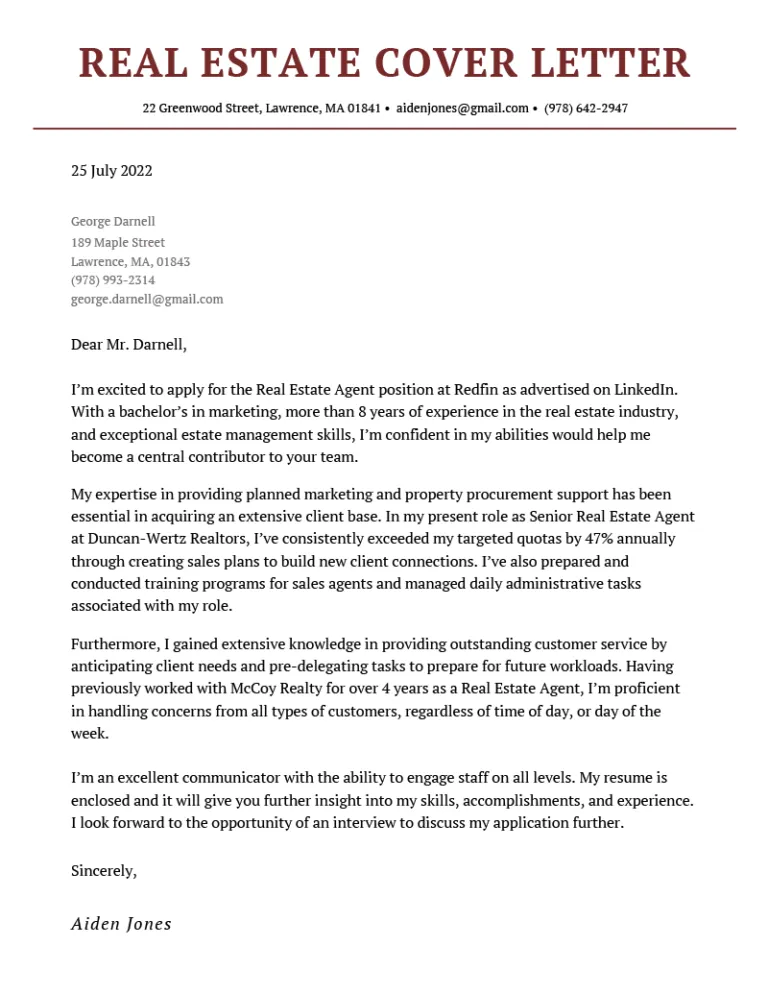
In your closing paragraph, include a clear call to action. Thank the hiring manager for their time and consideration. Reiterate your interest in the position and express your availability for an interview. Provide your contact information again, making it easy for them to reach you. Make it clear that you are eager to discuss your qualifications further and look forward to hearing from them. A strong call to action leaves a lasting impression and encourages the hiring manager to take the next step in the hiring process. End on a positive note, reinforcing your interest and enthusiasm for the opportunity, and your willingness to contribute to the company’s success.
Formatting and Design Tips for Your Cover Letter
Choose the Right Font and Size
Select a professional and readable font, such as Times New Roman, Arial, or Calibri. Use a font size between 10 and 12 points for easy readability. Ensure your letter is well-formatted with consistent spacing and margins. Avoid using overly fancy or decorative fonts, which can distract from the content of your letter. Your goal is to make your cover letter easy to read and visually appealing. Proper formatting enhances the overall presentation and makes your application more professional. A well-formatted cover letter indicates attention to detail and respect for the hiring manager’s time. Ensure your letter is visually balanced, with appropriate margins and spacing to avoid a cluttered appearance.
Keep it Concise
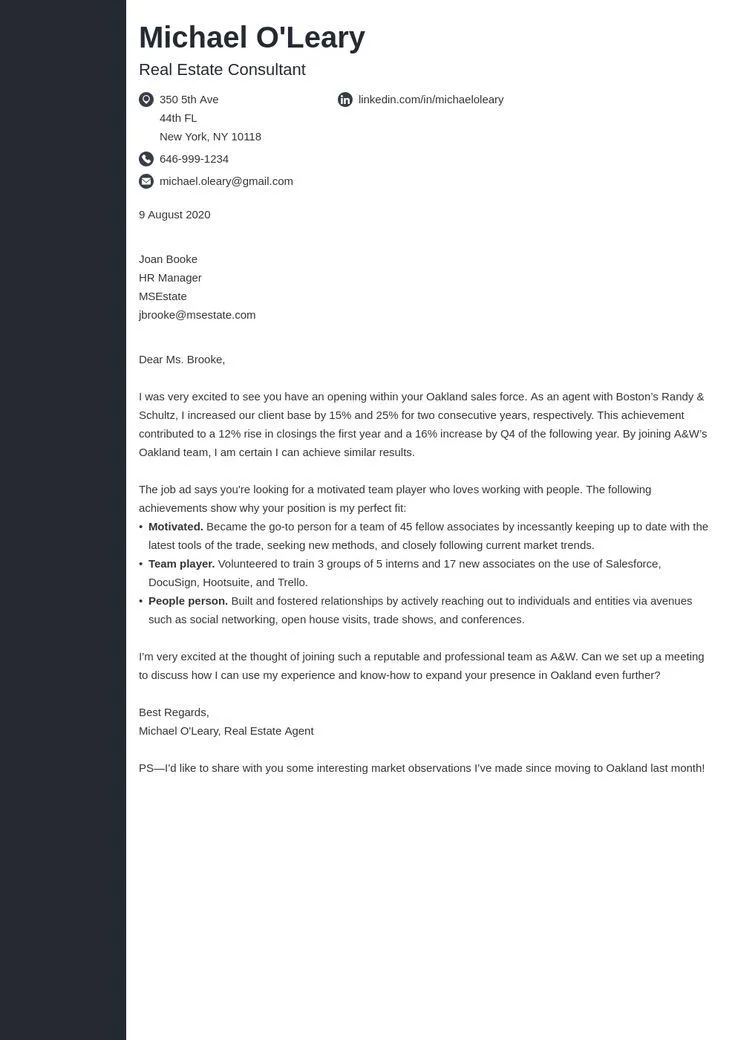
Keep your cover letter concise and to the point. Aim for a maximum of one page. Hiring managers are busy and don’t have time to read long, rambling letters. Focus on the most important information and highlight your key qualifications. Be specific and avoid unnecessary jargon or overly long sentences. Get straight to the point and make every word count. A concise cover letter shows that you respect the hiring manager’s time and that you can communicate effectively. It’s essential to convey your message clearly and quickly, emphasizing your most relevant skills and experience. Brevity and clarity increase the likelihood of your letter being read and understood.
Proofread Carefully
Proofread your cover letter meticulously for any typos, grammatical errors, or formatting inconsistencies. These errors can create a negative impression and undermine your credibility. Use a grammar and spell checker, but also read your letter carefully yourself, as these tools may not catch every mistake. Have someone else review your letter for a fresh perspective. Attention to detail is critical in real estate, so a flawless cover letter demonstrates your professionalism and attention to detail. A well-proofread letter shows that you take your application seriously and are committed to presenting yourself in the best possible light. Correct any mistakes before submitting your application.
Real Estate Cover Letter Examples
Example for a Sales Agent Position
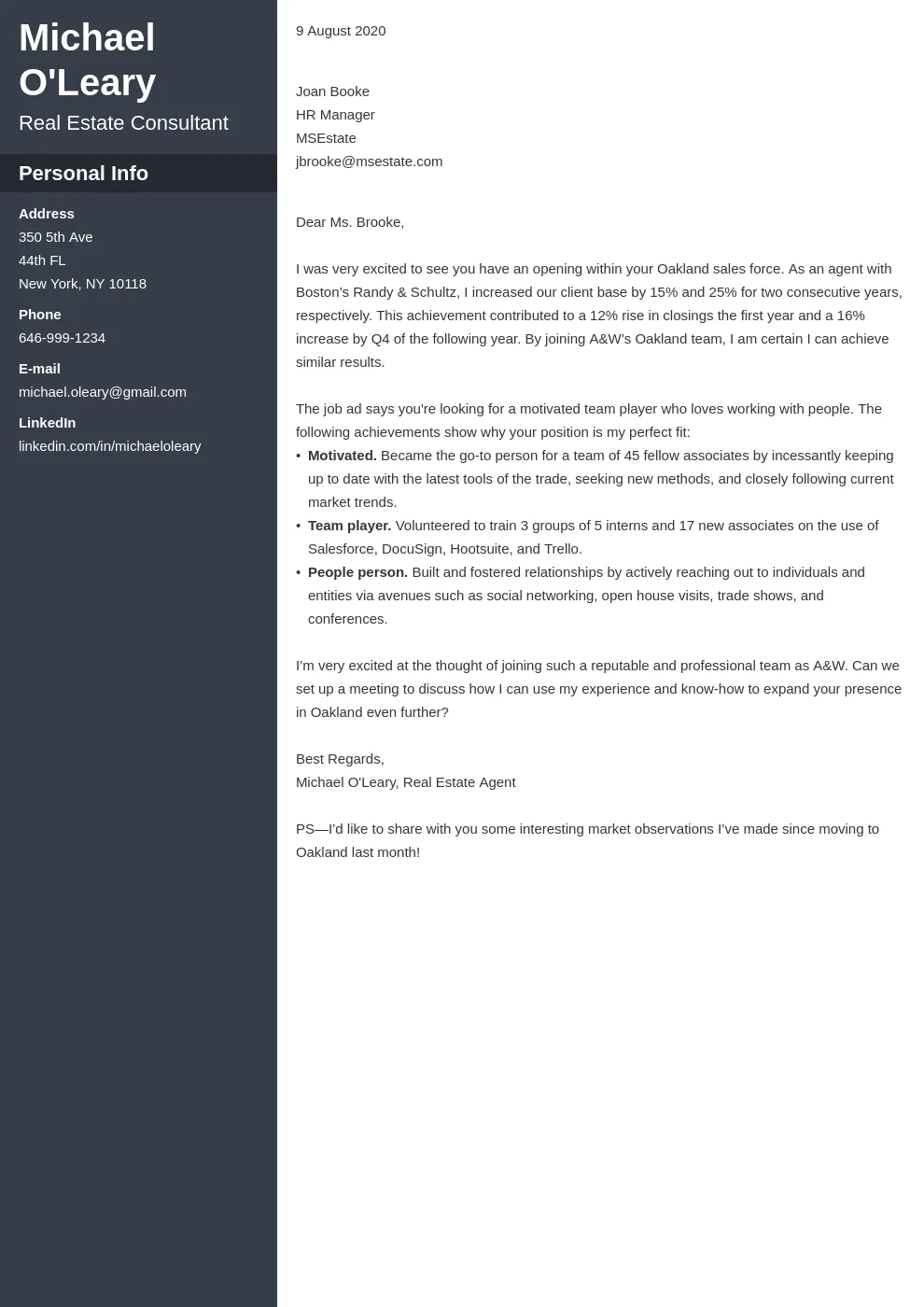
Here is an example you can adapt for a sales agent position. Adapt the template to include your own experience and specific details. [Your Name] [Your Address] [Your Phone Number] [Your Email] [Date] [Hiring Manager Name] [Hiring Manager Title] [Company Name] [Company Address] Dear [Mr./Ms./Mx. Last Name], I am writing to express my enthusiastic interest in the Sales Agent position at [Company Name], as advertised on [Platform]. With [Number] years of experience in real estate sales, I have a proven track record of exceeding sales targets and providing exceptional client service. In my previous role at [Previous Company], I consistently ranked among the top 10% of sales agents, closing an average of [Number] deals per month. My strong negotiation skills, market knowledge, and dedication to customer satisfaction have enabled me to build a loyal client base and achieve remarkable results. I am particularly drawn to [Company Name]’s commitment to [Company Value] and [Specific Initiative], which aligns perfectly with my own professional values. I am confident that my skills and experience make me an ideal candidate for this position, and I am eager to contribute to the continued success of your team. Thank you for your time and consideration. I look forward to the opportunity to discuss my qualifications further in an interview. Sincerely, [Your Name]
Example for a Property Manager Position
Here is an example you can adapt for a property manager position. Adapt the template to include your own experience and specific details. [Your Name] [Your Address] [Your Phone Number] [Your Email] [Date] [Hiring Manager Name] [Hiring Manager Title] [Company Name] [Company Address] Dear [Mr./Ms./Mx. Last Name], I am writing to express my interest in the Property Manager position at [Company Name], as advertised on [Platform]. With [Number] years of experience in property management, I possess a comprehensive understanding of all aspects of managing residential and commercial properties. In my previous role at [Previous Company], I was responsible for managing a portfolio of [Number] properties, ensuring tenant satisfaction, and maintaining property values. My key responsibilities included tenant screening, lease administration, property maintenance coordination, and budget management. I am skilled in using property management software, such as [Software Name], and have a proven ability to resolve issues efficiently and effectively. I am particularly impressed with [Company Name]’s dedication to [Company Value] and [Specific Initiative], which reflects my own commitment to providing excellent service and creating positive living environments. I am confident that my skills and experience align perfectly with the requirements of this position, and I am eager to contribute to the success of your team. Thank you for your time and consideration. I look forward to the opportunity to discuss my qualifications further in an interview. Sincerely, [Your Name]
Common Mistakes to Avoid
Generic Letters
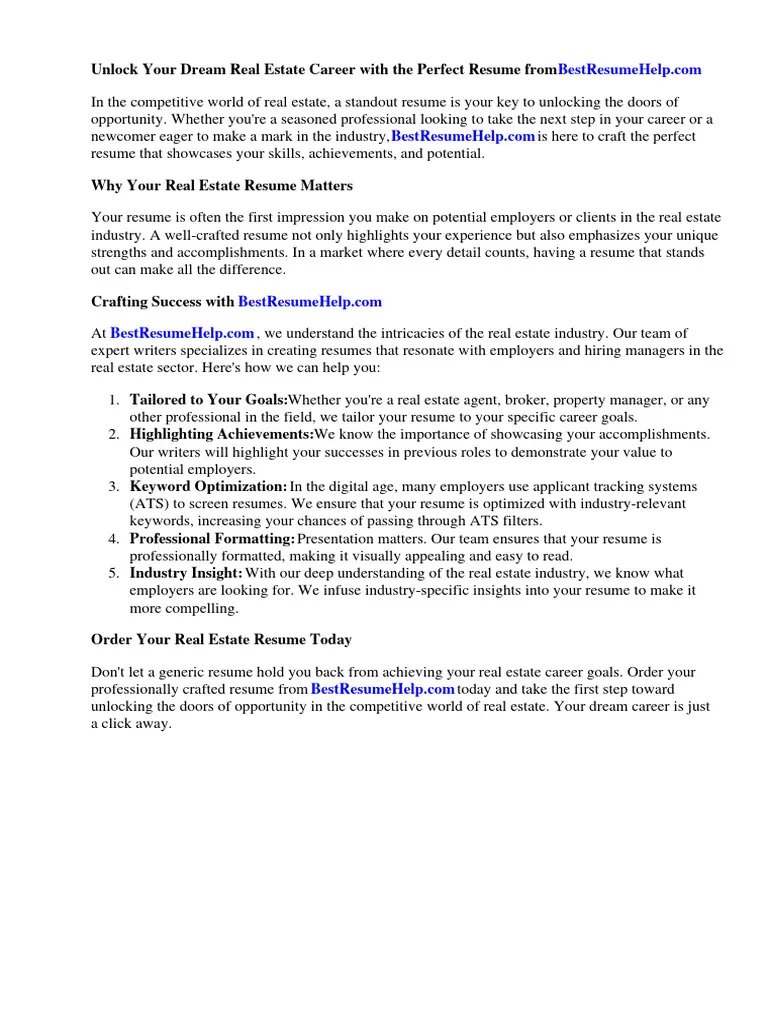
Avoid sending generic cover letters that could be used for any job. Tailor each letter to the specific position and company. This demonstrates that you have taken the time to research the opportunity and are genuinely interested in the role. A generic letter indicates a lack of effort and can quickly lead to your application being rejected. Personalize your letter by mentioning the specific job requirements, the company’s values, and how your skills and experience align with the position. Demonstrate that you understand the company and its needs. Your cover letter should reflect your genuine interest and enthusiasm for the specific opportunity, rather than being a mass-produced document.
Typos and Grammatical Errors
Carefully proofread your cover letter to avoid any typos or grammatical errors. These errors can create a negative impression and undermine your credibility. A well-written, error-free cover letter shows that you pay attention to detail and are committed to presenting yourself professionally. Always use a spell checker, but also manually review your letter to catch any mistakes the spell checker might miss. Have a friend or family member review your letter as well to catch any errors you might have missed. Make sure the language is clear, concise, and easy to understand, emphasizing your ability to communicate effectively. A clean, polished cover letter is crucial to making a positive first impression and increasing your chances of getting an interview.
Lack of Specificity
Avoid being vague or using generic statements. Provide specific examples of your achievements and skills. Quantify your results whenever possible (e.g., ‘increased sales by 20%’). A cover letter that lacks specifics is less likely to impress the hiring manager. Demonstrate how you have applied your skills and knowledge to achieve specific results. Use real-world examples to highlight your contributions and accomplishments in previous roles. Instead of saying ‘I am a good communicator,’ provide an example of how you effectively communicated with clients or colleagues. Provide details of your achievements, showing the impact of your actions. Specificity makes your letter more compelling and memorable, setting you apart from other applicants.
Tips for Writing a Strong Cover Letter
Research the Company
Before writing your cover letter, research the company thoroughly. Visit their website, read their ‘About Us’ page, and review their social media profiles. Understand their mission, values, and culture. Tailor your cover letter to reflect your understanding of the company and how you can contribute to its success. This shows the hiring manager that you have taken the initiative to learn about their organization and are genuinely interested in the opportunity. Referencing specific aspects of the company, such as recent projects, awards, or initiatives, can make your letter more compelling. This research will help you customize your cover letter and make a stronger case for why you’re a great fit. It demonstrates your proactiveness and enthusiasm.
Show, Don’t Tell
Instead of simply stating your skills, demonstrate them with concrete examples. Provide specific instances where you used your skills to achieve positive results. Quantify your accomplishments whenever possible (e.g., ‘increased sales by 15%’). This approach makes your cover letter more compelling and memorable. Show the hiring manager what you can do, rather than just telling them. For example, rather than saying ‘I am a good negotiator,’ describe a situation where you successfully negotiated a deal and the positive outcome. Highlighting specific experiences with tangible results shows your abilities and provides concrete evidence of your value. Focus on what you did, the actions you took, and the outcomes you achieved, providing the hiring manager with clear evidence of your skills.
Follow Up
After submitting your cover letter and resume, follow up with the hiring manager or the company’s HR department. Send a brief email or make a phone call a week or so after submitting your application. Express your continued interest in the position and reiterate your qualifications. Following up demonstrates your enthusiasm and proactive approach. If you have not heard back after a reasonable period, it’s appropriate to politely inquire about the status of your application. Thank the hiring manager for their time and consideration. Following up shows you are genuinely interested in the position and are eager to learn more. Remember, the job application process doesn’t end when you click ‘submit.’ It’s a continued process of engaging with the potential employer and expressing your enthusiasm.
